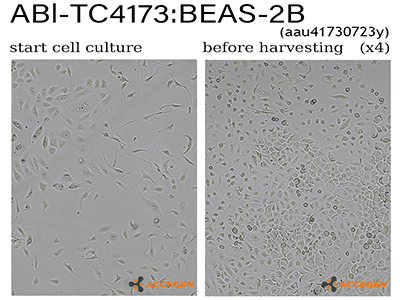Featured Products
Explore Products
- In-Stock Tumor Cell Lines
- Human Orbital Fibroblasts
- Human Microglia
- Human Pulmonary Alveolar Epithelial Cells
- Human Colonic Fibroblasts
- Human Type II Alveolar Epithelial Cells
- Human Valvular Interstitial Cells
- Human Thyroid Epithelial Cells
- C57BL/6 Mouse Dermal Fibroblasts
- Human Alveolar Macrophages
- Human Dermal Fibroblasts, Adult
- Human Lung Fibroblasts, Adult
- Human Retinal Muller Cells
- Human Articular Chondrocytes
- Human Retinal Pigment Epithelial Cells
- Human Pancreatic Islets of Langerhans Cells
- Human Kidney Podocyte Cells
- Human Renal Proximal Tubule Cells



 Harris’ research group through transfection with an adenovirus 12-SV40 hybrid virus, followed by continuous cell passaging for immortalization. Besides possessing typical epithelial characteristics, BEAS-2B cells also exhibit non-epithelial features, resembling mesenchymal stem cells. They express specific surface markers like CD73, CD90, CD44, and CD105, and demonstrate the ability to differentiate into both osteogenic and adipogenic lineages. Additionally, BEAS-2B cells effectively impede the proliferation of PHA-activated total T lymphocytes and Th1 lymphocytes derived from peripheral blood mononuclear cells (PBMCs).
Harris’ research group through transfection with an adenovirus 12-SV40 hybrid virus, followed by continuous cell passaging for immortalization. Besides possessing typical epithelial characteristics, BEAS-2B cells also exhibit non-epithelial features, resembling mesenchymal stem cells. They express specific surface markers like CD73, CD90, CD44, and CD105, and demonstrate the ability to differentiate into both osteogenic and adipogenic lineages. Additionally, BEAS-2B cells effectively impede the proliferation of PHA-activated total T lymphocytes and Th1 lymphocytes derived from peripheral blood mononuclear cells (PBMCs).
